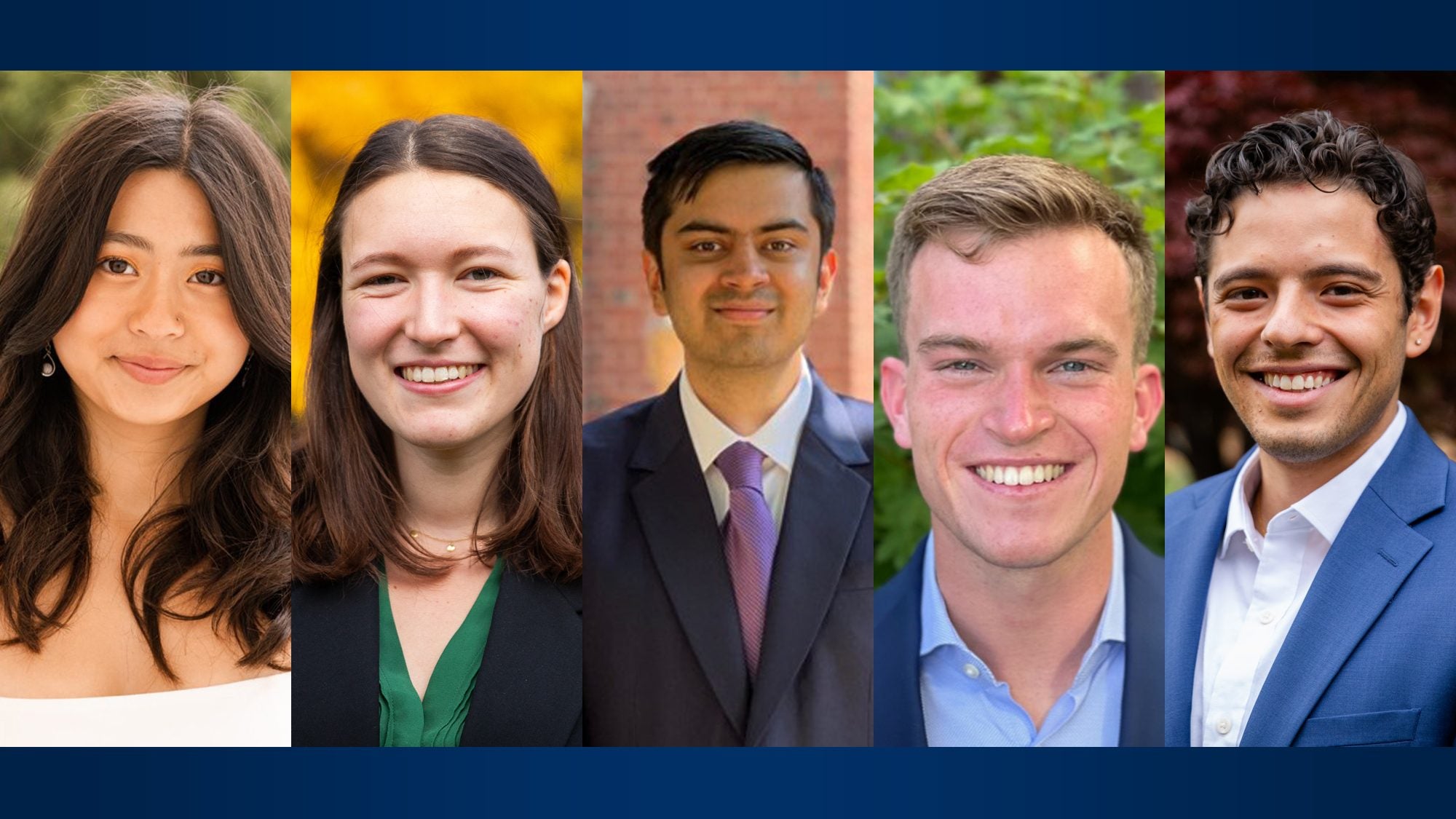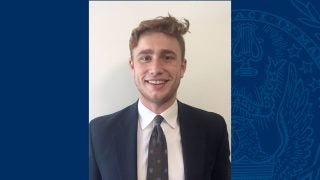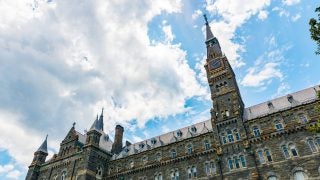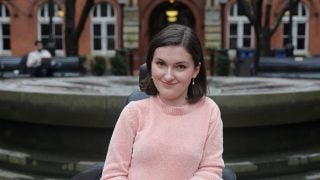The three students and two alumni are among 51 recipients of the fellowship this year, which selects outstanding American scholars to pursue their graduate education at any university in the United Kingdom. This year marks the first time Georgetown has ever produced five or more Marshall Scholars.
“The Marshall Scholarship is a remarkable achievement. On behalf of our entire University community, I wish to offer my most sincere congratulations to the five students and alumni who were selected this past year,” said Georgetown President John J. DeGioia. “This is a wonderful recognition of their commitment to academic excellence and their dedicated efforts to advance the common good of our international community. We look forward to all that they will accomplish in the years ahead.”
Each of this year’s Marshall winners worked extensively with the Center for Research and Fellowships (CRF) to support their candidacies for the prestigious scholarship. CRF oversees the nomination and development process for any Georgetown student or young alumni interested in applying to a number of scholarships, such as the Marshall and Rhodes Scholarships.
Learn more about Georgetown’s five newest Marshall Scholars.
Adrian Ali-Caccamo (SFS’24)
Adrian Ali-Caccamo (SFS’24) is dedicated to tackling inequity in education. 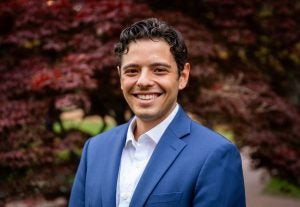
At his St. Paul, Minnesota, high school in which over 40 percent of his classmates came from low-income households, Ali-Caccamo witnessed how under-resourced schools hindered students’ potential.
Ali-Caccamo dedicated his time at Georgetown to pursuing equity in education, where he contributed to changing the history core curriculum in the School of Foreign Service (SFS), supported the implementation of an undergraduate South Asian Studies certificate and helped diversify admissions through the launch of the SFS Ambassador and Peer Mentor Programs to increase outreach to underserved schools and students. He is also among the first group of Laidlaw Scholars at Georgetown.
Ali-Caccamo paired his advocacy with experience in the classroom. Through DC Reads and Georgetown’s partnership with the National Education Equity Lab, he tutored students and directly combatted the barriers he witnessed as a student by teaching and mentoring low-income high schoolers in international relations. It was through these experiences, along with two policy jobs Ali-Caccamo has held, that he realized the vital importance of a pre-kindergarten to post-secondary public education system.
“I loved the personal connections, the community and the joy of teaching. But, in each experience, I saw new challenges in the caste system of American education,” Ali-Caccamo says. “The personal-level relationships contributed to systemic level observations: race, zip code and parental education too often predict a child’s life outcomes in the United States.”
In the United Kingdom, Ali-Caccamo plans to pursue two master’s degrees in two years: a master’s in comparative education at the University College London and a master’s in education, public policy and equity at the University of Glasgow. He hopes his graduate studies will empower him to craft policy interventions grounded in empirical evidence that will help address the inequities in U.S. education.
“As someone focused on education policy, I am grateful for the immeasurable impact that my grandparents, parents, teachers and professors have had on my growth. Most importantly, as I begin my graduate studies I will continue using my voice to advocate for those students who have long been under-supported and abandoned by our school system,” Ali-Caccamo said. “I’m often told that changing U.S. education is impossible, but this opportunity reaffirms my belief that we can indeed build a more equitable future for our children if we so desire.”
Hari Choudhari (SFS’24)
While an intern at the Centre for Cross-Border Studies this summer, Hari Choudhari (SFS’24) got a front-row seat to what it takes to pursue meaningful peacebuilding in Northern Ireland, a region that still carries indelible scars from the Troubles in the second half of the 20th century. 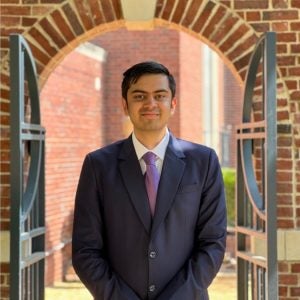
It was also during his internship that he saw the shortcomings of a solely top-down approach to peacebuilding. Choudhari and his coworkers were working under the shadow of the Legacy Bill, a controversial bill passed by the House of Commons in September that grants conditional amnesty for those accused of murder during the Troubles.
“Politics, labor markets, identity, purpose — violence leaves nothing unscathed. The victims and witnesses of violence I met in Northern Ireland cannot simply ‘move on,’ having endured far too much to ever accept its return,” Choudhari said. “Yet policymakers, through failing to incorporate community perspectives, hamstring their own ability to understand what true peacebuilding actually entails.”
Coming back from Northern Ireland, Choudhari crystallized his belief that peacebuilding takes both high-level policymaking at the top while also bringing in marginalized voices and the actual victims who have been most affected by conflict.
Choudhari, who has been a Laidlaw Scholar while at Georgetown, plans to use his Marshall Scholarship to study conflict transformation and social justice at Queen’s University of Belfast and global leadership and peacebuilding at King’s College London.
“The Marshall scholarship is an incredible opportunity for me to gain the skills and knowledge necessary to build bridges between policymakers and communities in conflict scenarios,” he said. “ I am grateful for the chance to foster connections in Northern Ireland and across the UK that will fuel my commitment to empathetic, responsive and responsible peacebuilding policy.”
He hopes that his education in the United Kingdom will ultimately lead him back to the United States, where he plans to work on peacebuilding efforts that put the voices of victims and local communities first and foremost.
Naomi Greenberg (C’24)
A commonly known fact about reproductive biology and genetics is genes tend to have a 50% chance of being passed down from parent to offspring. But when Naomi Greenberg (C’24) learned that may not always be the case, she was fascinated. 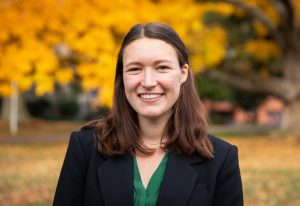
Greenberg was working at the National Institute of Health (NIH) when she saw what’s known as a gene drive system at work. Through this natural system, the probability of transmission for a specific gene can reach 100%.
“The experience of seeing a real gene drive system in action at the NIH was pivotal for me,” said Greenberg, who is a recipient of the prestigious Goldwater Scholarship. “Witnessing firsthand an exception to the so-called ‘laws’ of genetics turned my theoretical interest into a practical one, and ignited my motivation to become a gene drive researcher.”
One way scientists can use gene drive systems is to prevent mosquitoes and their offspring from transmitting malaria.
Yet while this novel technique holds untold promise for science, it also poses serious ethical questions about genetic modification. That’s why Greenberg wants to not only be a biologist at the forefront of genetics, but also an adept communicator capable of translating complex biology to the public to foster greater trust and dialogue between scientists and non-scientists.
Greenberg plans to pursue a master’s degree in systems and synthetic biology at Imperial College London and a master’s in science communication and public engagement at the University of Edinburgh.
She intends to one day pursue a Ph.D. in molecular and cellular biology back in the United States to better understand and contribute to the field of genetics.
“I see this scholarship as the realization of a massive amount of work — of course from the scholars themselves, but also from our professors, advisors and peers who helped along the way. When I found out I had received the Marshall scholarship, I was incredibly surprised,” Greenberg said. “I was also very heartened to see that the selection committee agreed with my goals of improving science communication and science literacy. It is encouraging to see something that seemed so aspirational become possible.”
Michael Lundgren (SFS’22)
Michael Lundgren (SFS’22) started working in early childhood classrooms in the middle of his college career as a preschool aide at HoyaKids, a childcare center at Georgetown. After graduation, he headed to St. Louis as part of the Coro Fellowship in Public Affairs, a civic leadership program, where he was charged with designing a policy that would allocate $250 million to universal access to early childhood education in the city. 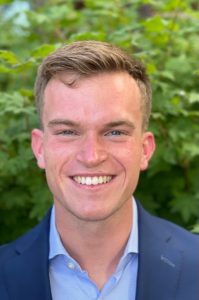
It didn’t take him long to recognize the wide disparities that exist in early childhood education. In St. Louis, Lundgren learned that many families spend more on childcare than housing, while childcare providers often lack sufficient resources to operate.
As part of his fellowship, Lundgren met with a group of childcare providers in the city dedicated to advocating for local change. Through learning about the challenges childcare providers face, Lundgren came to understand no one solution could solve the problem.
“$250 million could help, but it was not enough. Not nearly enough,” Lundgren said. “Childcare is not a commodity, but a basic human necessity … We need a public early childhood care and education system in the United States.”
With his Marshall Scholarship, Lundgren intends to pursue a master’s in education focusing on child development at the University of Oxford, followed by a master’s in education, public policy and equity at the University of Glasgow.
“I am honored to be a Marshall Scholar. I thank my family, teachers and mentors for their support. In particular, I thank Dr. Lauren Tuckley at the Center for Research and Fellowships for believing in me and guiding me through this process,” Lundgren said. “My mission in life is to care for others, and I know my Marshall studies in the UK will help me realize my vision of a world where every child receives the care they need and deserve.”
Anya Wahal (SFS’23)
Growing up in the Sonoran Desert in Arizona, Anya Wahal (SFS’23) had an innate understanding of how precious water is to communities in dry climates. 
At the same time, Wahal also witnessed Arizona undergo rapid population growth and development at the expense of using up scarce water resources.
Wahal wanted to understand how these water shortages affected rural farmers and took on an ethnographic and policy research project in her home state. Wahal met with nearly 30 farmers in rural Arizona. In addition to getting to know how these farmers dealt with drought, Wahal built lasting relationships with the local communities that were grounded in mutual trust and understanding.
“It showed me the need to uplift those most affected by water crises, not blaming them,” said Wahal, who has been a Pelosi Scholar and a Provost’s Fellow at Georgetown. “The perception in Arizona is that farmers are at fault for the worsening water crisis — yet after meeting farmers firsthand, I realized that most actually wanted to be water-conscious.”
Through her Marshall Scholarship, Wahal plans to pursue a master’s degree in water science, policy and management at the University of Oxford. Wahal ultimately hopes to return to the U.S. to pursue a Ph.D. and continue her research to become an academic practitioner in water policy and management.
“The opportunity to study at Oxford — my dream program — positions me to become the best interdisciplinary water researcher I can be. When I first got the call, I was in shock — I started crying and shaking, and thanked the chair for the ‘best news ever,’ Wahal said. “I hope to use this scholarship to continue fighting for water justice for the rest of my career and cannot emphasize enough what this means not just for me, but for my family and for everyone who has helped me along the way.”
